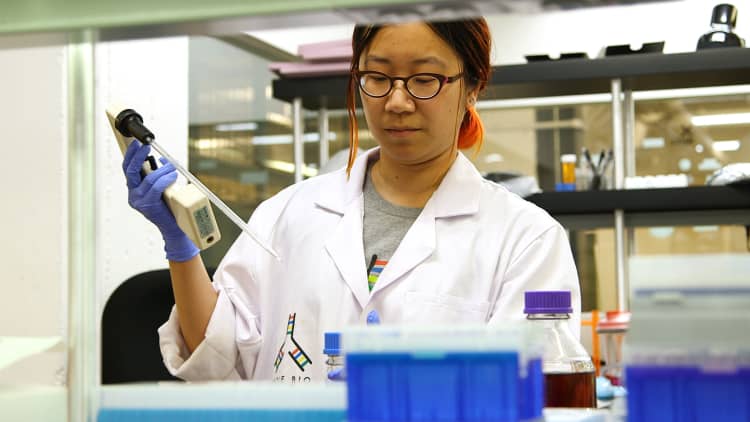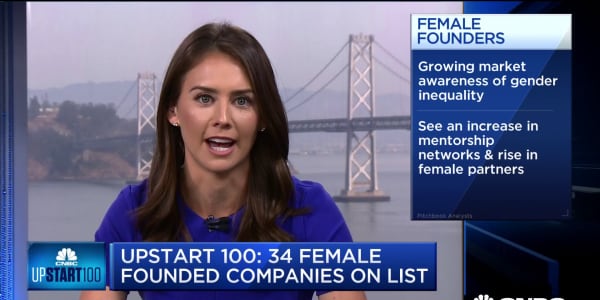When two Princeton graduate students came together with the goal of using biology to improve products and make them more sustainable, Geltor was born.
Geltor, based in San Leandro, California, produces the protein collagen without animals. Collagen is found in a variety of foods, personal-care products and other items, such as shampoos, body lotions, strings for musical instruments and gelatin.
Alex Lorestani and Nick Ouzounov, the co-founders of Geltor, met in 2012 in the molecular biology department at Princeton University. They began to use fermentation to produce collagen in a San Francisco lab called IndieBio, which provides $250,000 in funding and a four-month program to jump-start their business.
The process is similar to how beer is fermented. Geltor scientists take carbon, nitrogen and oxygen and convert them into collagen using microbial fermentation.
More from Upstart 100:
CNBC unveils its list of 100 promising start-ups to watch in 2018
How a media upstart that explains the news got Ryan Seacrest and Jimmy Iovine to invest
Two Shark Tank winners are turning TV success into millions with one key ingredient
"If you're able to shrink yourself down and dive into it Magic School Bus-style, what you would see is basically a broth that is in the beginning really full of basically plant-based nutrients that are then being converted and pumped out into the broth into collagen," Lorestani said. "You'd basically be sitting inside of a little factory that is really focused on building this one particular thing very efficiently."
After the collagen is extracted, it can be used in liquid form or made into a powder to be used in consumer products. The company is currently focused on cosmetics and consumer care, though it is interested in branching out into other fields, such as medicine and nutrition.
The company now has 17 full-time employees, and it secured $2.25 million in additional funding in 2016.
A vegan alternative with a vast market
Jeremy Coller was one of Geltor's earliest investors. Rosie Wardle, the program director of the Jeremy Coller Foundation, who advises on Coller's investments, believes this method is how protein will be produced in the future.
"The current system of protein production is a broken system," Wardle said.
"It's resource-intensive and having a massive detrimental impact on the environment. Business as usual isn't really an option for the protein-production sector going forward. So we started looking at companies that were providing the solutions to that, and Geltor was one of the companies that is focused on exactly that."
"There's an enormous diversity of collagens in nature," co-founder Lorestani said.
"About 70 percent of the collagen in the market comes from one source, which is pigs, and that was kind of an arbitrary way of how to get this very important ingredient."
Gelatin, which is made from animal-produced collagen, is used in gummy bears, candy, marshmallows and more. Geltor's vegan alternative can tap into this $3 billion market and provide an alternative for vegetarians and vegans seeking these gummy products. Until now, other vegetarian ingredients, like agar-agar and carrageenan, have worked as substitutes.
However, Geltor's collagen isn't a substitute for collagen. It is collagen.
"It's nature-identical," Lorestani said. "It's just a pure protein, identical to the one you would find wherever. We just make it a different way."
Hurdles to overcome
Geltor launched its first product, 1% N-Collage Solution, an animal-free collagen ingredient for skincare, in April at the trade show In-Cosmetics Global in Amsterdam. One month later, N-Collage won the 2018 Cosmetic Executive Women Innovation Award.
The company's products will have to be vetted by the Food and Drug Administration to ensure their safety, but the processes vary on what the collagen is being used for. Generally Recognized as Safe, or GRAS, is a certification about an ingredient that companies can submit to the FDA after they review their own products.
Jaydee Hanson, the senior policy analyst at the Center for Food Safety, said he wants more regulation. He has followed several biological engineering companies including Geltor for a while.
"We don't think that GRAS should be used for the first new genetically-engineered gelatin or any other product," Hanson said. "We think it ought to go through the more structured process that requires more rigorous scientific testing."
VegInvest, a firm dedicated to supporting vegan-based companies, is another one of Geltor's investors. Managing Director Amy Trakinski said that the co-founders do value transparency in their work.
"Both Alex and Nick are forthcoming, transparent and honest," said Trakinski. "They're one of the main reasons we have so much faith. Once they're able to really scale, the sky's the limit from food and beverage to cosmetics to tissue engineering."
The company is continuing to create new products with their collagen, but has not announced anything publicly.
"It is important for us to have the long view of improving people's lives through biotechnology, whether that means through better products, more sustainable processes while also having the milestones out in front of us with a small team which is really focused on growing this collagen business globally over the next year," Lorestani said.
WATCH: Inside the San Francisco lab growing meat in a petri dish







